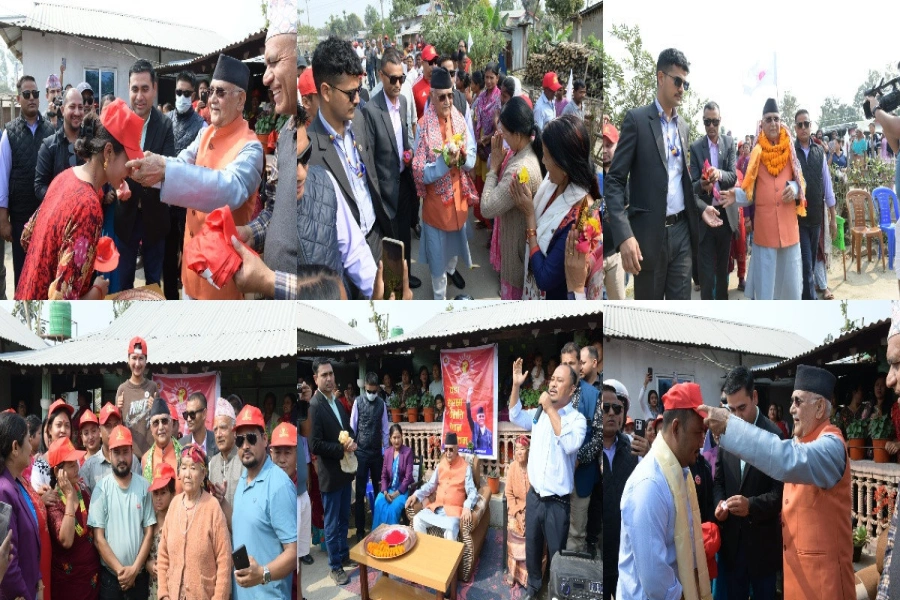Generations of the 60s and the 70s grew up blaming Girija Prasad Koirala for mishandling democracy. This generation will grow up blaming Oli for doing nothing
As the first government formed under the hard-earned constitution has completed its five months, situations are developing in such way (and Prime Minister K P Oli himself is responsible for this) that I don’t feel confident enough to write about him without a disclaimer note. The first I came to know about Oli was during the anti-monarchy movement of 2006. Oli then was in news for saying republic is a mission impossible. When Maoists came into mainstream politics he maintained his status by denigrating them, in every way possible. At one time he projected himself as the protector of ‘dons and goons’ within the party, sidelining honest leaders. I did not like that Oli.
Then came 2015. I have admired him for the stand he took for the nation in the most difficult times of the year and appreciate his ‘pro-Nepal’ stand, until, of course, truths to the contrary emerge. We were in a serious crisis at the moment and needed someone to stand up and say: I will not betray the country. Oli fulfilled that role, which is why he is the prime minister today.
Declining influence
The fascination that he exuded and the respect he commanded three years ago and during first two months in office are fast declining. Those speeches he delivered in the parliament and from Rara Lake sound like things from the past. The interaction he held with diplomatic community, his ‘nation-first’ stand, his efforts in establishing balanced ties with India and China remain shadowed by the mess his administration is creating or the inaction with which he has chosen to respond to pressing issues.
It feels like the declaration to end the transportation syndicate was a smokescreen. His promises of good governance ring hollow. He suffered by far the worst dent in his image when Dr Govinda KC started his hunger strike and his cadres and leaders (reportedly the PM was kept in the dark about the whole saga for about 20 days) started to spew venom on saintly doctor. Oli came to be seen as the leader opposed to reforms in medical education and protecting crony capitalists. Wisdom prevailed at the end and agreements of his government with Dr KC have salvaged his image to some extent but many other challenges wait.
Beyond authoritarianism
Executive meeting held to popularize mini great wall

Slogans of authoritarianism and totalitarianism should have been best left to Nepali Congress which has been struggling to make its presence felt in want of other credible agendas. It is always good to warn the government against authoritarianism but the rhetoric has not convinced me yet. For me, authoritarianism will be when I cannot write columns like this, when I must sing praise of the ruling party, when Nepali Congress will be prohibited to stage demonstrations (it did so on Tuesday across the country) and when I will be questioned for writing what I write. Otherwise, what is happening under Oli has happened back in the past too.
What happened in Jumla was police atrocity but Dr Govinda KC was arrested in the middle of the night by the police during the premiership of Sher Bahadur Deuba too. If that was not authoritarianism, Jumla incident is not.
Oli is failing to fulfil his promises, he is failing to govern but if failure to govern, and not working according to people’s aspirations amounts to authoritarianism, let’s admit, Nepal has been under authoritarianism for the last 28 years.
But authoritarianism will be made the weapon to lash out communist (this word might discredit Oli’s government internationally). Not surprisingly, those who hated Oli for his ‘pro-Nepal’ stand of 2015 are promoting narrative of authoritarianism. In the days to come, they will scratch the wounds of the past. The narrative that the constitution has disenfranchised 50 percent of people will be emphasized, and in the worst case, the issue of province demarcation which has been already settled might be revived. Another Madhes protest might be launched and this time around, for lack of other credible agenda, they will raise autonomy agenda. It does not need much to destabilize politics in this country.
And then some of our intellectuals and opinion makers will start calling for addressing ‘genuine’ demands of Madhes. With foreign investment in media becoming new normal, media might also be used as a tool to justify the unjustifiable.
Entangled as Oli will be in petty issues like protecting interest of his coteries and business nexus, he will have completely failed on governance by which time he will be seen as the source of all problems. Desperate to return to power, Congress will exploit every situation to that end. If the co-chair of his party, Pushpa Kamal Dahal, the prime minister in waiting, severs ties with the party (which he might do), Oli will have no option but to leave.
Compulsion to succeed
Oli must not fail not because he is the best leader we have had but because his failure will be costly for the people and, most possibly, for the country. If he fails, it will fundamentally change the political course.
Nepalis are used to with making and breaking of governments. Those born in the 60s and 70s have seen government change in every six or nine months. But in Nepal’s history when popular government with full mandate has failed or was made to fail, it has precipitated the political disaster.
King Mahendra took over in 1960 citing failure of B P Koirala’s government on good governance and rule of law. When the government of Girija Prasad Koirala failed in early 1990s, mainly because of his own mishandling of politics, it precipitated years of instability and then the civil war. Both 1960s and 90s were the turning points of Nepali politics.
The generations of 60s and 70s grew up blaming Girija Prasad Koirala for mishandling democracy. This generation will grow up blaming Oli for doing nothing despite having sweeping mandate and despite becoming the PM in the most favourable times in history (favourable because China and India are in relatively better terms and Nepal has had good relations with both the world economic powers).
Making amends
First of all, Oli must prove authoritarianism allegations wrong with action. Power corrupts and absolute power corrupts absolutely, goes the popular saying. Oli must use two-thirds majority to correct the years of misrule. He wisely addressed the concerns of Dr KC. He must display similar wisdom in dealing with other pressing issues. In other words, he must rule like a socialist democrat.
What the government tends to ignore becomes the matter of great significance for common people. What would have happened if the government, on ill advice of its supporters, had ignored the demands of Dr KC and gone ahead with ‘my way or highway’ attitude? Oli government would be in deep trouble by now.
Second, he should listen to parties in opposition. Parties in Nepal, which lose all wisdom while in power, act wise while in opposition. They raise voice against corruption and advocate for democracy, accountability and rule of law. Congress has not done so yet but others like Bibeksheel Sajha have long advocated for these issues. Every legitimate concern, wherever it comes from must be listened to.
He should not hesitate to dismiss the non-performing ministers from the cabinet. Such ministers care nothing about good governance. Their only goal is to make hay while the sun shines. The prime minister has been speaking way too much. He should speak less and work more. People want to see him and his ministers deliver.
Prime minister and ministers usually do not read op-eds in English. I warn the government because I don’t want to live with guilt of not warning on time.






































